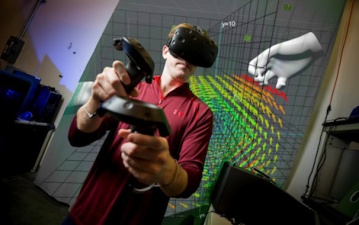Vive’s accelerator program for VR/AR, Vive X, has grown with its third investment in new companies from across the globe. This batch of 26 companies will have access to a range of Vive resources to aid their maturity and transition to market.
The program acts as a service-oriented investor, offering each successful startup a chance to utilise the Vive team’s expertise in the form of mentorship, engineering support, promotion and extensive network in the industry. Not only investing financially, but also putting in place newly acquired knowledge to strengthen a startup’s ability to stand on its own beside industry giants.
New companies with investment include Yue Cheng Tech, which aims to become the Netflix-equivalent in VR, and Neurable, who are developing a brain-computer interface for VR control.
Alongside this investment, Vive is expanding its operations into a fifth location in Tel Aviv.
Marc Metis, Vice President at HTC Vive said, “Our focus with Vive X is to partner with companies across the globe that will solve industry pain-points… This third batch is filled with incredibly talented and promising teams who are focusing on foundational technologies and key verticals including enterprise, healthcare, entertainment, and education”.
Vive X has invested in more than 80 companies since its launch in July 2016.
The companies included in Vive X Batch 3 are:
San Francisco
- Neurable is developing a brain-computer interface for VR control. The startup combines research in neuroscience and machine learning, and it interprets electroencephalography (EEG) signals for real-time interaction input. It’s like controlling things with your mind.
- Apelab seeks to level the playing field for content creation for VR/AR. Its software toolkit Spatial Stories will enable developers, designers, or anyone without coding knowledge to build fully interactive XR content within an immersive environment and then export it to various platforms.
- Cala offers a full software solution that empowers fashion designers to turn ideas into garments faster — from first sketch to production and everything in between. Its 3Dscanning technology allows consumers to easily take body measurements with smartphone photos and AR technology, then receive their orders with the right fit.
- Cloudgate Studio is an acclaimed game development studio behind hit VR titles Brookhaven Experiment and Island 359. Cloudgate wants to make game tech modules that will lead to a big hit in VR esports. Virtual Self allows users to see their body in VR and stream their gameplay without expensive setups.
- eLoupes provides a real-time surgical imaging system for the operating room. It combines light field rendering and head mounted displays so hospitals can bring surgeons a solution that is superior to traditional imaging systems like microscopes while saving costs and improving patient outcomes.
- Nanome seeks to make science and engineering easier to learn using VR and blockchain technology. The company is creating a more intuitive interface to interact with scientific data in hopes of accelerating scientific innovation.
- Quantum Capture is building the behavioral engine that will power the AI-assisted virtual agents. Combining photo-real 3D characters, procedural animation systems and support for cognitive AI, Quantum Capture aims to equip developers with the necessary tools to create virtual human-based applications, while reducing costs and compressing production timelines.
- QuarkVR is working on next-generation compression and streaming technology for untethered VR and AR experiences. It is a hardware-agnostic software solution that supports 4K per-eye resolution and is capable of streaming to a dozen simultaneous users in the same environment with minimal latency. (That means no interaction delays.) That sounds pretty amazing for social VR experiences.
Beijing
- Future Tech is a Chengdu, China-based studio that creates games and VR content for users around the world. The team is founded by industry veterans with experience from companies such as Ubisoft, Gameloft, PDE, and Virtuos. Its Mars Alive has won numerous industry awards globally.
- Genhaosan (GHS) is a VR entertainment solution for karaoke. The GHS VRK systems installed in karaoke rooms allow users to enjoy immersive experiences like singing like a rock star on stage, interacting with their audience, and sharing their performances on social media.
- JuDaoEdu is dedicated to the research and development of VR labs for K-12 students. The product is applicable for physics, chemistry, biology and science education and the company’s vision is to provide students with authentic and safe VR lab environment.
- Lenqiy is a VR content developer providing innovation and creativity education to teenagers. Its VR tools focus on science, engineering, technology, art and mathematics. By bringing creativity into product design, Lenqiy wants to make learning an enjoyable journey of exploration for teenagers.
- PanguVR is an AI-driven VR technology company with a focus on advanced computer vision. Its core engine, powered deep learning and processing thousands of terabytes of data, allows users to create six-degree-of-freedom (6DoF, or full movement) VR environments in minutes simply by uploading 3D assets or even 2D pictures. The process is fast and produces quality output at only a fraction of the cost associated with manual process.
- Pillow's Willow VR Studios creates fairy tale games for both three-degrees-of-freedom 6DoF VR. It focuses on good visuals while maintaining fast performance. The company is making non-violent casual VR games with characters that are suitable for all ages.
- Yue Cheng Tech aims to become the Netflix in VR. The company has more than 300 VR apps from 50-plus partners in 15 countries. It has introduced those apps to China through a VR cinema. YCT also produces its own content.
Shenzhen
- Antilatency specializes in positional tracking solutions for VR/AR that enable multiplayer VR experiences within the tracking area without scale limits. It works with either mobile or tethered VR headsets.
- Configreality focuses on understanding how human spatial perception works across physical and virtual space simultaneously. With its proprietary spatial compression algorithm, users can feel as if they are walking in an infinitely large space even when the physical space is limited.
- Super Node is a visual intelligence company that enables machines to learn their surrounding environments. The solution brings low-cost, high-accuracy obstacle avoidance, 6DoF tracking and SLAM (simultaneous localization and mapping) capabilities to VR, AR and robotics.
- VRWaibao offers a multiplayer collaboration platform in VR, while also creating a wide range of enterprise VR applications for customers in banking, manufacturing, real estate, healthcare, military, and more.
- Wewod is focused on delivering location-based entertainment and educational VR experiences. The team has done 3D production work for renowned clients like Disney, Bandai Namco, and Nintendo.
Taipei
- Cover provides a virtual livestreaming platform which users can perform with their avatars for audience to watch via mobile devices. It also offers live shows featuring their own virtual celebrities.
- Looxid Labs has developed an emotional analytics platform optimized for VR using bio-sensors that measure users’ eyes and brain activities. Its machine learning algorithm is capable of analyzing users’ emotional states, providing valuable data that can be leveraged to make a real impact in users’ VR experiences.
- Red Pill Lab applies deep learning algorithms to optimize the workflow of real-time character animation. Its voice-to-facial engine and full body IK-solver work together to add a new level of realism to virtual characters in VR games.
- VRCollab takes modeling to the next level, enabling architects, engineers, planners and consultants to collaborate seamlessly on construction projects. Its software converts models for use in design reviews, building requirement approval, and construction coordination. It also automates document generation.
Tel Aviv
- Astral Vision turns existing amusement park rides into VR attractions, offering a more compelling and refreshing customer experience without engaging in capital-intensive upgrades.
- Remmersive was founded by technologists and race driving champions to create a new breed of fully immersive driving simulators with technology, providing a more engaging and true-to-life experience.













